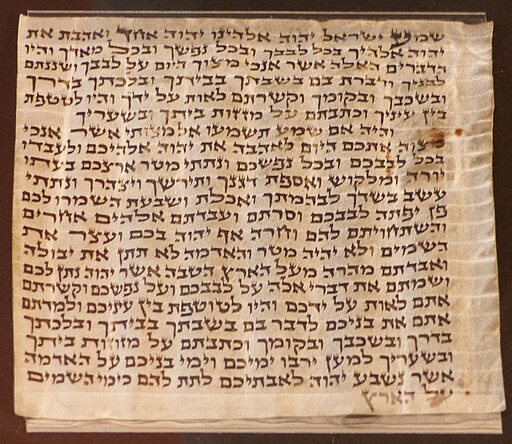שמע ישראל
(יהוה) [אדוני] אלוהינו, (יהוה) [אדוני] אחד
Shemá Israel, Adonai Elohéinu, Adonai Ejad
Shemá Israel (del hebreo, שְׁמַע יִשְׂרָאֵל, ‘Escucha, Israel’) es el nombre de una de las principales plegarias de la religión judía. Su nombre retoma las dos primeras palabras de la oración en cuestión, siendo esta a su vez la plegaria más sagrada del judaísmo.
Oye, Israel, Adonai es nuestro Di-s, Adonai es Uno.
[en voz baja] Bendito sea el nombre de la gloria de Su reino por siempre jamás.
Amarás a Adonai tu Di-s con todo tu corazón, con toda tu alma con toda tu fuerza. Y estas palabras que Yo te ordeno hoy estarán sobre tu corazón. Las enseñarás a fondo a tus hijos, y hablarás de ellas al estar sentado en tu casa y al andar por el camino, al acostarte y al levantarte. Las atarás como señal sobre tu mano y serán por recordatorio entre tus ojos. Las escribirás sobre las jambas de tu casa y en tus portones.
Shemá Israel Adonai Elohéinu Adonái Ejád
[en voz baja:] Barúj Shem Kevód Maljutó Leolám Vaéd
Veahavtá et Adonai Elohéja, Bejól Levavjá, Uvejól Nafshejá, Uvejól Meodéja. Vehaiú Hadvarím Haéile Ashér Anojí Metzavjá Haióm Al Levavéja. Veshinantám Levanéja Vedibartá Bam, Beshivtejá Beveitéja, Uvelejtejá Vadérej, Uveshojbejá, Uvkumejá. Ukshartám Leót Al Iadeja Vehaui Letotafot Bein Eneja Uktabtam al Mezuzot Beitéja, Uvishearéja.


